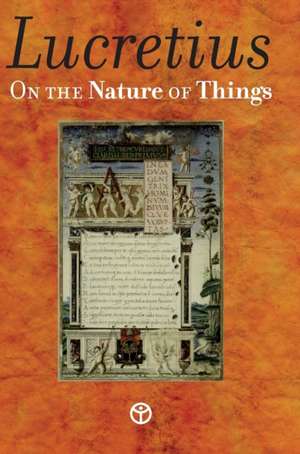On the Nature of Things
Autor Titus Lucretiusen Limba Engleză Hardback – 29 dec 2019
Preț: 150.81 lei
Nou
Puncte Express: 226
Preț estimativ în valută:
28.86€ • 29.96$ • 24.07£
28.86€ • 29.96$ • 24.07£
Carte tipărită la comandă
Livrare economică 25 martie-08 aprilie
Preluare comenzi: 021 569.72.76
Specificații
ISBN-13: 9789187611261
ISBN-10: 9187611260
Pagini: 286
Dimensiuni: 153 x 216 x 20 mm
Greutate: 0.53 kg
Ediția:2. Auflage
Editura: Timaios Press
ISBN-10: 9187611260
Pagini: 286
Dimensiuni: 153 x 216 x 20 mm
Greutate: 0.53 kg
Ediția:2. Auflage
Editura: Timaios Press
Notă biografică
Titus Lucretius Carus (c. 99 BC - c. 55 BC) was a Roman poet and philosopher. His only known work is the philosophical poem The Nature of Things, a didactic work about the tenets and philosophy of Epicureanism. Lucretius has been credited with originating the concept of the three-age system which was formalised in 1836 by C. J. Thomsen. Very little is known about Lucretius's life; the only certain fact is that he was either a friend or client of Gaius Memmius, to whom the poem was addressed and dedicated. The Nature of Things was a considerable influence on the Augustan poets, particularly Virgil (in his Aeneid and Georgics, and to a lesser extent on the Eclogues) and Horace. The work virtually disappeared during the Middle Ages, but was rediscovered in 1417 in a monastery in Germany by Poggio Bracciolini and it played an important role both in the development of atomism (Lucretius was an important influence on Pierre Gassendi) and the efforts of various figures of the Enlightenment era to construct a new Christian humanism. Lucretius's scientific poem The Nature of Things (c. 60 BC) has a remarkable description of Brownian motion of dust particles in Book II. He uses this as a proof of the existence of atoms. Lucretius was probably a member of the aristocratic gens Lucretia, and his work shows an intimate knowledge of the luxurious lifestyle in Rome. Lucretius' love of the countryside invites speculation that he inhabited family-owned rural estates, as did many wealthy Roman families, and he certainly was expensively educated with a mastery of Latin, Greek, literature, and philosophy.
